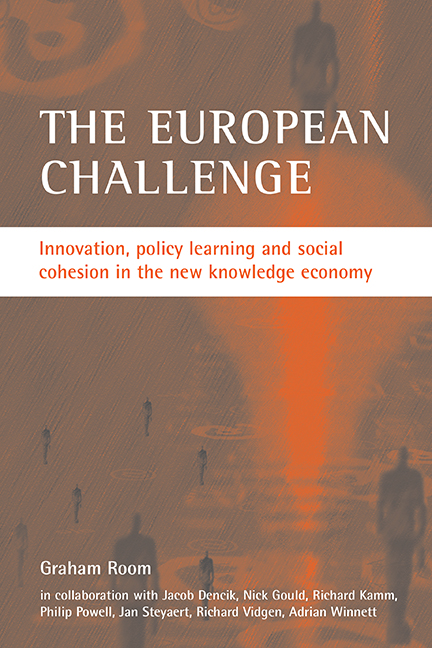Book contents
- Frontmatter
- Contents
- List of figures and tables
- Preface
- one The new knowledge-based economy
- two The EU response
- three Growth and stability
- four Dynamics and innovation
- five Enterprise and organisational change
- six Human investment and learning
- seven Social cohesion and inclusion
- eight Models and measurement
- nine Benchmarking and governance
- ten Globalisation and the knowledge economy
- Endnotes
- References
- Index
three - Growth and stability
Published online by Cambridge University Press: 18 January 2022
- Frontmatter
- Contents
- List of figures and tables
- Preface
- one The new knowledge-based economy
- two The EU response
- three Growth and stability
- four Dynamics and innovation
- five Enterprise and organisational change
- six Human investment and learning
- seven Social cohesion and inclusion
- eight Models and measurement
- nine Benchmarking and governance
- ten Globalisation and the knowledge economy
- Endnotes
- References
- Index
Summary
Policy concerns: the macroeconomy
The US economy enjoyed sustained growth through the 1990s and this, although interrupted during 2001/2 thereafter made some recovery. This was the more remarkable, when set against the performance of Japan and the Eurozone, both becalmed. This was also the period when it seemed that a new economy might be developing, based around the new information technologies. Here also the US was the leader, Japan and the EU the laggards. The implication seemed clear: the new information technologies were driving economic growth, and at an accelerated tempo.
To disentangle the various elements involved in this process, and to measure their respective contributions to economic growth, became a key challenge for national policy makers, seeking to establish where and how to offer support. Should they concentrate on providing fiscal stability and sound macroeconomic management? Or would they need also to intervene to ensure adequate stocks of human capital, an appropriate infrastructure supporting innovation and incentives to entrepreneurship? Questions such as these are at the heart of the major studies of the new economy emanating from the OECD and the US Department of Commerce, as discussed in our opening chapter. The conclusions are fairly clear: fiscal stability and institutions fostering competitive markets are essential and without these, action on other fronts is unlikely to bear fruit.
The stability or instability of the new economy has also been a major concern in public debate. The sustained growth of the US economy suggested that the new economy might provide greater stability of development than did the old; the rise and fall of the ‘dotcoms’ around the turn of the century suggested the contrary (US Department of Commerce, 2002a, ch 2). Nevertheless, as economies recovered, a modest degree of confidence returned (US Department of Commerce, 2003, ch 1).
Meanwhile, the European Union was forging economic and monetary union, with strict rules of fiscal discipline, as laid down in the Stability and Growth Pact. If the new economy had novel characteristics, in terms of growth and stability, this might prove to be of major significance for economic and monetary union. It would be essential to monitor the development of the new economy, and to secure whatever degree of national policy convergence was necessary, in order to support the stability and growth objectives of EMU.
- Type
- Chapter
- Information
- The European ChallengeInnovation, Policy Learning and Social Cohesion in the New Knowledge Economy, pp. 23 - 28Publisher: Bristol University PressPrint publication year: 2005



